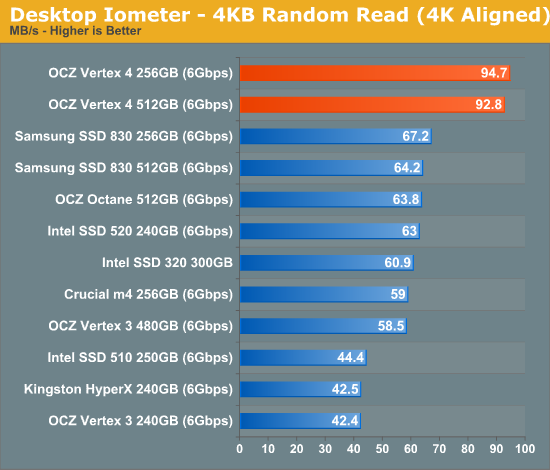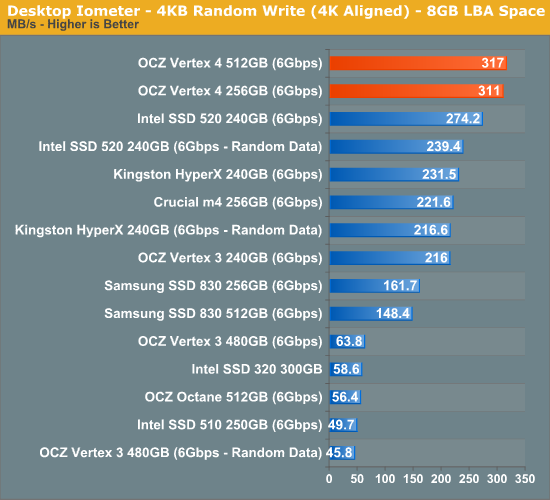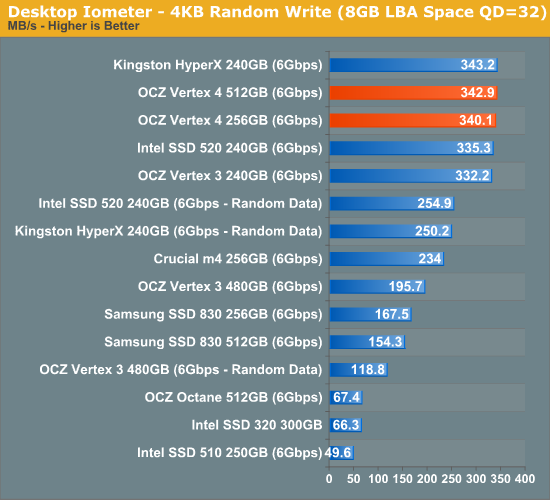OCZ Vertex 4 Review (256GB, 512GB)
by Anand Lal Shimpi on April 4, 2012 9:00 AM ESTRandom Read/Write Speed
The four corners of SSD performance are as follows: random read, random write, sequential read and sequential write speed. Random accesses are generally small in size, while sequential accesses tend to be larger and thus we have the four Iometer tests we use in all of our reviews.
Our first test writes 4KB in a completely random pattern over an 8GB space of the drive to simulate the sort of random access that you'd see on an OS drive (even this is more stressful than a normal desktop user would see). I perform three concurrent IOs and run the test for 3 minutes. The results reported are in average MB/s over the entire time. We use both standard pseudo randomly generated data for each write as well as fully random data to show you both the maximum and minimum performance offered by SandForce based drives in these tests. The average performance of SF drives will likely be somewhere in between the two values for each drive you see in the graphs. For an understanding of why this matters, read our original SandForce article.
Random read performance is staggering - a good 40% higher than anything else we've tested. While the cutoff for usefulness on a client drive is likely much lower than what even the Octane could deliver, this sort of performance bodes very well for OCZ's enterprise ambitions.
Randomly write performance is also just excellent. SandForce's peak numbers come close, but throw in any sort of incompressible data and they quickly take a step back while the Vertex 4 is able to deliver. Again, I'm actually more interested in these numbers from an enterprise workload standpoint but heavy client users will definitely not be disappointed.
Many of you have asked for random write performance at higher queue depths. What I have below is our 4KB random write test performed at a queue depth of 32 instead of 3. While the vast majority of desktop usage models experience queue depths of 0 - 5, higher depths are possible in heavy I/O (and multi-user) workloads:
SandForce always scaled well at higher queue depths, but again we're looking at best case performance for the SF-2281. Move towards incompressible data and the Vertex 4 is alone at the top.













127 Comments
View All Comments
gigahertz20 - Friday, June 29, 2012 - link
Yes, I would like to see if the newer firmware has fixed this as well as OCZ promised. I wish they would create an update for this review.yj100 - Monday, July 9, 2012 - link
I got a Vertex 4 512gb a week ago for my MacBook Pro and after 2 days it crashed. Only a gray screen with a spinning wheel would come up when trying to boot.Apparently this is common as OCZ have a forum thread dedicated to this. Apparently they have a firmware fix but it didn't help me.
I have a 256gb Vertex 4 for about a couple of months with no problems. For 512gb I'm going to stay away from the Vertex 4.
Zarathustra[h] - Wednesday, July 25, 2012 - link
As some other sites have tested, it seems like the Vertex 4 is a completely different drive with the newer 1.4 firmware, and 1.5 added even more performance.Has Anandtech considered revisiting this drive with a later firmware? I have much more faith in Anandtechs reviews on SSD's than others and would love to see this drive tested with the latest firmware.
Zoeff - Sunday, July 29, 2012 - link
I second this.The heavy/light storage bench is unique to Anandtech and feels much more representative of actual usage.
Salv0 - Wednesday, August 1, 2012 - link
+1Retest with the latest fw will be great!
teefatt - Monday, September 3, 2012 - link
To potential OCZ SSD buyers,I posted the above matters to OCZ forum and got no solution from them after many email in and out in a week time. They want me to write an email to HP for help. They even deleted my reply and make the post like I did not reply their request or reply their mail. Furthermore, they blocked my post. They wanted me to send them a personal email instead of on the public forum.
They moved my post to ForumOCZ Support ForumCompliments, Complaints, & SuggestionsVertex 4 512GB BSOD in RAID 0 setup.
or
http://www.ocztechnologyforum.com/forum/showthread...
That's why I totally agree with the post here on the first page:
"It's still a drive from OCZ, a company that has repeatedly and blatantly used its customer base as unpaid beta testers, and lambasted them when they dared to complain about it. No thank you. The fastest drive in the world is of no use to me if it's causing my computer to BSOD constantly. I'll be spending my money and that of my many clients on drives with proven track records for reliability and excellent customer service, both sadly lacking in OCZ products."
I will walk away from this OCZ unreliable SSD. Luckily I am able to return the drives and asked for refund instead of following their steps to do the beta tester in a week time.
Think twice before you buy it.
Thanks you.
vwrafi - Saturday, September 29, 2012 - link
Hi. When the drive goes into the GC mode ( standard mode ), does it mean that the drive will start to read and write its internal data ? If so, does it mean that the write lifetime of the cells will reduce ( write lifetime of the disk will be reduced every time it reorganize itself ) ? And if so, can we switch off this or install firmware that do not shorten the write lifetime of the disk ?